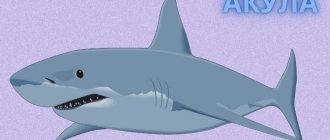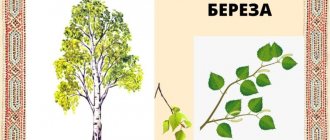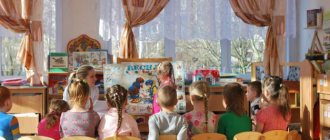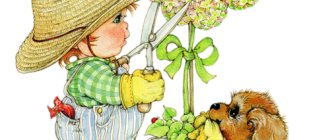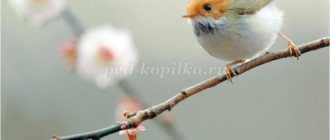BIRD LAKE
The shores of the bird lake are surrounded on all sides by dense forest and thickets of vines and reeds, which are reflected as in a mirror on its calm, smooth surface, occasionally disturbed by a flower falling into the water or an overripe, bursting fruit with a row of numerous small seeds in the shape of a diadem visible inside it.
This wonderful corner of the zoo is home to many birds of various colors, sizes and shapes. There you can see pink flamingos with long, thin legs like the stems of water lilies and a large curved beak; Snowy King Heron; black ibises with a bronze tint on dark feathers. Silent, calm, dazzling white swans sat in the shadows, gracefully bending their long necks. And a little further, hiding among the foliage of a tree leaning low towards the water, a black swan with a red beak resembling a rosebud emits plaintive, gentle cries, similar to a mother’s call.
One edge of the lake ends with a waterfall, with noise and splashes filling the second, smaller lake, in the middle of which there is an island overgrown with thick grass, in which nimble coots with a beak as white as an orange blossom and motley wild ducks flash.
On this tiny island, some birds lovingly build nests and hatch their chicks. During the period when the chicks appear, their thin and shrill squeak merges with the voices of the birds into a harmonious choir.
At the end of the second lake, the water again forms a waterfall, surrounding and washing another island covered with flowering thickets of bamboo, among the slender stems of which nest the elusive Florida ducks and a flock of motley Peking ducks, small and important as seahorses.
The gentle chirping, singing, whistling and fluttering of birds, the squeaking of chicks transform the bird lake into a cozy, charming place that awakens a deep feeling of love and kindness in the soul of the visitor.
Source
GOLDEN HORSE
The Palomino foal lives in the zoo, golden and shiny like caramel, playful and cheerful like a child. As he gallops around his paddock, the wind blows his light mane and tail like golden yarn. Palomino snorts, shakes his head and laughs from the overwhelming joy of life. Sometimes he rises on his hind legs and shows his glossy belly, on which sunbeams play merrily.
The Palomino is a breed of dwarf horse native to the western United States. He was brought to Cuba as a very small foal, but even then he was as playful and mischievous as he is now. Palomino loves being visited by zookeepers he knows. He begins to say cheerfully, as if inviting them to play with him. If one of the servants calls him by name, he raises his small head with long blond bangs falling over his light blue eyes, and emits a thin melodious neigh, and then at a graceful trot approaches the person, snorts, shakes his head affably, so his shiny mane flutters in the wind and allows himself to be stroked.
MONKEY ISLAND
Just outside the wide gates of the Havana Zoo, on the left side of the entrance, there is a monkey island, where a troop of funny, skinny and lanky spider monkeys with long limbs and small heads live. Spider monkeys originate from Central and South America. Their tail, like almost all monkeys of the South American continent, is like this. flexible and strong, which serves them as an extra hand to grasp various objects and cling to tree branches.
Monkeys are very afraid of water and do not try to escape from the island located in the very center of a small lake, so they live there in freedom, frolicking and playing carefree all day long. You can often see how some monkey, holding a palm leaf or a tree branch in its tail, runs away from its fellow tribesmen who are pursuing it. Sometimes they come up to the very shore of the island and try to reach a floating leaf or flower with their tail, or simply hit the water with it.
Every day one of the zookeepers brings them food by boat. As soon as they see him, the monkeys immediately rush towards him with loud, joyful cries, and the most trusting and friendly ones climb onto his shoulders and caress him, hugging his head with their hands and wrapping their tails around his neck.
One day, when the attendant hesitated a little while giving the monkeys food, the three bravest of them jumped into the boat and, rowing through the water with their hands like oars, moved away from the island, safely crossed to the other shore and escaped. Although the monkeys were later caught and returned to the island, they felt happy because they had experienced a real adventure.
Fairy tale "Zoo"
Natalya Knoblokh
Fairy tale "Zoo"
This is the fairy tale we composed with our partner and children.
Fairy tale " Zoo "
One day an interesting story happened at the zoo . The polar bear cub caught a cold while his children were treating him to ice cream. This was the first time he got sick and his mother was very worried. How to treat the baby? - she thought.
And so she decided to find out about this from other mothers: the mother of a lion cub, the mother of a zebra, the mother of a crocodile, the mother of a giraffe and the mother of a penguin.
First they went to their mother, the lioness. She advised me to bask in the sun more and eat fruit.
Then they went to their mother, the zebra. The baby zebra's mother advised him to eat more grass.
And the crocodile’s mother’s advice was this: you need to drink more water.
Mother giraffe said that to be healthy you need to eat tree leaves, but only the top and juicy ones.
The penguin's mother gave the following advice: to be healthy, you need to swim more in cold water - to harden yourself.
Mama bear and cub liked all the advice, they were all correct. Mom and the cub began to apply their mothers’ advice and the cub never got sick again.
Layouts “Let's go to the zoo” When designing stands, corners, walking areas, sports and music halls, the teacher first of all tries to make everything harmonious. Photo report about the excursion to the zoo Photo report about the excursion to the zoo. Dear colleagues, allow me to share with you the positive emotions of a walk. Photo report about the excursion to the mini-zoo A big event took place in correctional groups No. 12 “Violets” and No. 13 “Chamomiles”: thanks to the parents and children of the forestry technical school.
Abstract of the educational activity “Excursion to the Zoo” Objectives of the priority educational areas: • “Artistic and aesthetic”: to cultivate independence and skills actively and creatively.
Master class “I play in the zoo” u]Goal of the project:[/u] To consolidate children’s knowledge about the representatives and workers of the zoo, develop gaming skills, and engage in role-playing interaction. My tabletop theater “Jolly Zoo” “Theater is a magical world. He gives lessons in beauty, morality and ethics. And the richer they are, the more successful the development of the spiritual world is.
Summary of educational activities for speech development “Walk to the Zoo” Purpose. Teach children to create a picture and talk about its content, develop creative thinking. Learn to title a picture. Preliminary.
Project for a compensatory group “Zoo” Project matrix 1 Project name “Walks around the Zoo” 2 Project theme “Hello, unusual animals!” 3 Problem field of the project.
Fun on the water “Water Zoo” Objectives: To teach children to solve riddles. Continue teaching how to move along the bottom of the pool in different positions. Learn how to move your legs.
Source
